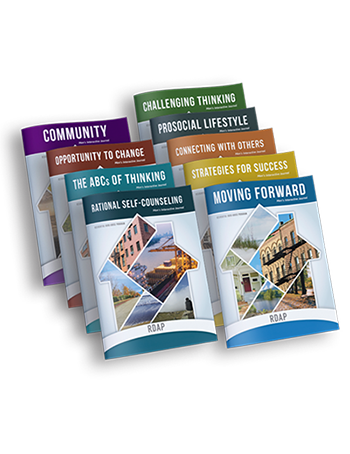From incarceration to stability: How RDAP supports recovery and reentry

Key Findings
Individuals who completed the RDAP program and used Interactive Journaling® were:
☑️ 2x less likely to engage in criminal activity
☑️ 4x less likely to relapse into substance use
☑️ 10x more likely to secure employment and stable housing
☑️ 3x less likely to have their supervision revoked
The problem
For many individuals returning to the community after incarceration, success depends on more than abstaining from substance use. Employment, housing stability, and strong coping skills are critical factors in sustained recovery. However, most prison-based treatment programs struggle to consistently address these areas in a structured, scalable way, particularly for individuals with substance use disorders.
In federal corrections, the Residential Drug Abuse Program (RDAP) was designed to fill this gap. Yet questions remained: Does the program foster lasting change? And will the cognitive-behavioral tools provided stick beyond the prison walls?
About RDAP
RDAP is a 9-month structured cognitive-behavioral treatment program that combines:
-
Small group therapy
-
Individual sessions with trained staff
-
A journaling component using customized Interactive Journals developed in partnership with The Change Companies
These Interactive Journals are based on cognitive-behavioral therapy, motivational interviewing, and expressive writing. They encourage participants to reflect on their behaviors, develop insight, and plan for their futures in a self-directed, yet guided way.
Participants in this study received a sequence of RDAP Journals and were encouraged to complete journal groups and individual assignments monthly.
Results
A follow-up study tracking 195 participants post-release found:
-
Criminal activity dropped significantly among program graduates. Those who completed RDAP were two times less likely to reoffend than those who dropped out.
-
Substance use relapse was reduced by a factor of four.
-
Employment and housing success increased tenfold. Program graduates were 10x more likely to gain stable housing and employment—both critical factors in successful reentry.
-
Supervision revocation rates fell by two-thirds. Completers were three times less likely to have their supervision revoked compared to non-completers.
Want to bring RDAP to your program?
Explore The Change Companies’ RDAP collection, now available through our digital platform, Atlas. These Journals are purpose-built for correctional settings, helping individuals gain insight, build critical thinking skills, and prepare for reentry.
Long-term implications
The benefits go well beyond individual outcomes. These results suggest:
-
Fewer returns to incarceration, reducing strain on correctional systems
-
Improved reentry outcomes, easing burdens on housing and employment support programs
-
Lower revocation rates, which reduce costs for parole and supervision

Evidence-based, behavioral health Interactive Journaling® curricula are available digitally on Atlas. Atlas can save staff time while supporting fidelity to evidence-based practices.
Ready to see what Atlas can do for your program? Visit our website to schedule a personalized demo today. Learn more about Atlas →
Provide your information below for a complete overview of Atlas for your setting.


